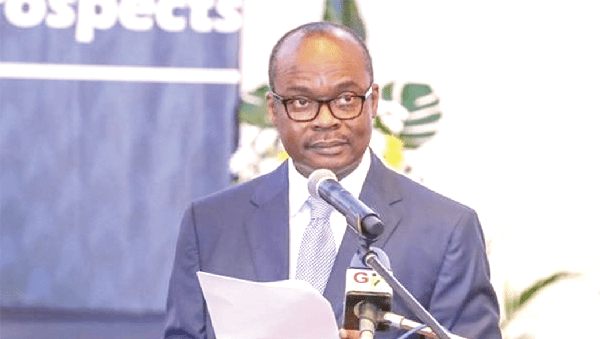BoG Governor speaks on economic challenges, resilience amidst crisis
Governor Addison elucidated that this yearly borrowing was predominantly directed towards fulfilling debt service and energy payment obligations. These commitments had ballooned to a significant $3 to $4 billion annually by 2020, underscoring the financial strain the nation was grappling with.

Dr. Ernest Addison, the Governor of the Bank of Ghana, addressed the media today during a special press briefing, shedding light on the intricate challenges faced by the nation’s economy in 2022. He expounded on the critical junctures that led to an economic crisis and highlighted the Bank’s robust response to mitigate the impact.
A pivotal aspect of Dr. Addison’s address centered around the loss of access to the international capital market, which triggered an immediate liquidity crisis for the Government. This crisis then snowballed into a balance of payments predicament as Ghana grappled with honoring its debt service commitments, energy payments, and import bills. The Bank of Ghana found itself in the crosshairs, losing a staggering $500 million in external reserves within just two months, with no replenishment from the annual Eurobond issuance, a customary source of foreign currency inflow.
- Advertisement -
The root cause of this financial turmoil lay in the widening sovereign spreads on Ghana’s Eurobonds and a subsequent downgrade of the nation’s sovereign debt rating by Credit Rating Agencies. This effectively cut off Ghana’s access to the international capital markets, a lifeline upon which the budget heavily relied to secure approximately $3 billion annually, addressing its financing gap.
- Advertisement -
Governor Addison elucidated that this yearly borrowing was predominantly directed towards fulfilling debt service and energy payment obligations. These commitments had ballooned to a significant $3 to $4 billion annually by 2020, underscoring the financial strain the nation was grappling with.
Amidst these challenges, the Bank of Ghana took proactive measures to alleviate the liquidity crisis. It extended additional overdraft facilities to the government, preventing domestic default and ensuring the fulfillment of critical debt obligations. This strategic intervention played a pivotal role in averting a disorderly halt to economic activity.
- Advertisement -
The Governor went on to detail how these exigencies prompted the Government to seek assistance from the International Monetary Fund (IMF) in July 2022. An IMF Mission was promptly dispatched to assess the situation, ultimately concluding that the economy stood at a tipping point. In consensus with the IMF, it was agreed that the Bank of Ghana should provide the necessary support to maintain economic stability until a comprehensive reform program could be implemented, paving the way for IMF financing.
Dr. Addison emphasized that the Bank of Ghana’s ability to intervene effectively during these challenging times was a testament to the policy buffers it had painstakingly built over years of prudent management. This resilience underscored the Bank’s pivotal role as the lender of last resort, upholding the economy’s stability during a crisis. He further stressed the historical inevitability of economic crises as part of the business cycle and the pivotal role policy buffers play in providing the necessary space to manage such events.
In his closing remarks, Dr. Addison conveyed a message of reassurance, asserting that the Bank of Ghana remains poised to uphold its statutory mandate and contribute to rebuilding a resilient and inclusive post-pandemic economy.
Source: Norvanreports
- Advertisement -



